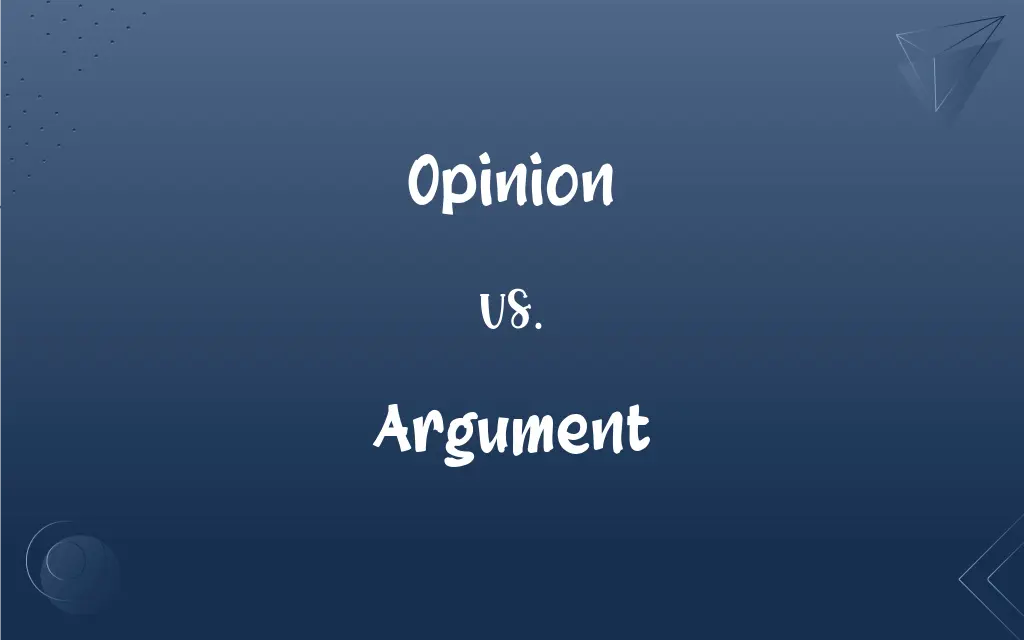Opinion vs. Argument: What's the Difference?
Edited by Aimie Carlson || By Harlon Moss || Updated on November 6, 2023
An opinion is a personal belief or judgment, while an argument is a series of statements presenting reasoning for or against something.

Key Differences
An opinion is an individual's view, belief, or judgment about something, which is not necessarily based on fact or knowledge. It's subjective and varies from person to person. For instance, one may have the opinion that chocolate ice cream is better than vanilla.
An argument, by contrast, is a series of statements typically used to persuade someone of something or to present reasons for accepting a conclusion. It is not merely a contradiction but includes reasoning, evidence, and logic to support its claims. In an argument about ice cream preferences, one would provide reasons why chocolate is superior to vanilla.
Opinions are often expressed in a personal and subjective manner and can be based on personal taste, preferences, or experiences. They don't require proof or evidence. For example, saying "I believe summer is the best season" is stating an opinion.
Arguments require a foundation of facts, evidence, or logical reasoning. They are structured and can be assessed based on the strength of the evidence and reasoning. For example, arguing that "Summer is the best season because it offers longer daylight hours and warmer weather for outdoor activities" presents a rationale.
Opinions can be part of an argument as the conclusion or as a premise if they are backed by evidence and reasoning. Conversely, an effective argument can influence people's opinions by demonstrating the validity of the point being made through logical reasoning.
ADVERTISEMENT
Comparison Chart
Definition
A personal belief or preference.
A series of statements to justify a position.
Dependence on Evidence
Does not require evidence.
Based on evidence and reasoning.
Subjectivity
Highly subjective.
Seeks objectivity through logic.
Purpose
To express a viewpoint.
To persuade or prove a point.
Structure
Can be a single statement.
Involves a premise and conclusion structure.
ADVERTISEMENT
Opinion and Argument Definitions
Opinion
A belief or judgment not based on certainty.
In my opinion, early morning workouts are more effective.
Argument
A reason or set of reasons given to persuade others that an action or idea is right or wrong.
His argument for renewable energy was compelling.
Opinion
A viewpoint formed about something, not necessarily based on fact.
His opinion on the movie was less favorable than mine.
Argument
A coherent series of reasons, statements, or facts intended to support or establish a point of view.
She presented a well-structured argument in her essay.
Opinion
A personal way of thinking about or approaching something.
She has a strong opinion on the importance of diet over exercise.
Argument
A process of reasoning or a debate involving differing points of view.
The discussion turned into an argument about animal rights.
Opinion
An estimation of the quality or worth of someone or something.
The critic’s opinion of the restaurant was that it was excellent.
Argument
An exchange of diverging or opposite views, often heated or angry.
They had an argument about political ideologies.
Opinion
A professional judgment given by an expert.
The architect’s opinion was that the building needed significant renovation.
Argument
A summary of the main points of a theory or proposal.
The author’s argument was summarized in the book's introduction.
Opinion
A belief or conclusion held with confidence but not substantiated by positive knowledge or proof
"The world is not run by thought, nor by imagination, but by opinion" (Elizabeth Drew).
Argument
A discussion in which the parties involved express disagreement with one another; a debate
Philosophical arguments over the nature of existence.
Opinion
A judgment based on special knowledge and given by an expert
A medical opinion.
Argument
An angry discussion involving disagreement among the participants; a quarrel
The roommates had an argument about whose turn it was to wash the dishes.
FAQs
Is an opinion always based on facts?
No, opinions can be based on personal beliefs, not just facts.
How do you identify an argument in text?
Look for a series of statements that lead to a conclusion, supported by evidence.
Do arguments always have a winner?
No, the goal of an argument should be understanding, not winning.
What makes a strong argument?
A strong argument is logically sound and well-supported by evidence.
Can opinions change?
Yes, opinions can change with new information or perspectives.
Do all arguments involve conflict?
Not necessarily; arguments can be a rational debate without conflict.
Can an argument be based on opinion?
Yes, but it must be supported by evidence to be persuasive.
How do you support an opinion?
With personal reasons, experiences, or beliefs.
Why is evidence important in an argument?
Evidence supports the claims and helps persuade others.
What is the difference between a fact and an opinion?
A fact is objective and verifiable, while an opinion is subjective and personal.
Is it important for an opinion to be popular?
No, the popularity of an opinion doesn't determine its value.
What is a fallacy in an argument?
A fallacy is a flaw in reasoning that weakens an argument.
What is an example of a common argument structure?
The Toulmin model: claim, support, warrant.
Can an opinion be a part of an argument?
Yes, as a conclusion or premise if backed by evidence.
Should opinions be respected?
All opinions should be respected, though not necessarily agreed with.
Can you have an argument with yourself?
Yes, internal deliberation is essentially arguing with oneself.
Can someone's opinion be wrong?
Opinions can be based on incorrect facts, but as personal beliefs, they are neither right nor wrong.
What’s the difference between arguing and discussing?
Arguing is trying to prove a point, while discussing is exchanging ideas.
How do you construct a logical argument?
By connecting premises logically to arrive at a conclusion.
Can arguments be emotional?
Yes, but strong arguments are typically more logical than emotional.
About Author
Written by
Harlon MossHarlon is a seasoned quality moderator and accomplished content writer for Difference Wiki. An alumnus of the prestigious University of California, he earned his degree in Computer Science. Leveraging his academic background, Harlon brings a meticulous and informed perspective to his work, ensuring content accuracy and excellence.
Edited by
Aimie CarlsonAimie Carlson, holding a master's degree in English literature, is a fervent English language enthusiast. She lends her writing talents to Difference Wiki, a prominent website that specializes in comparisons, offering readers insightful analyses that both captivate and inform.
































































